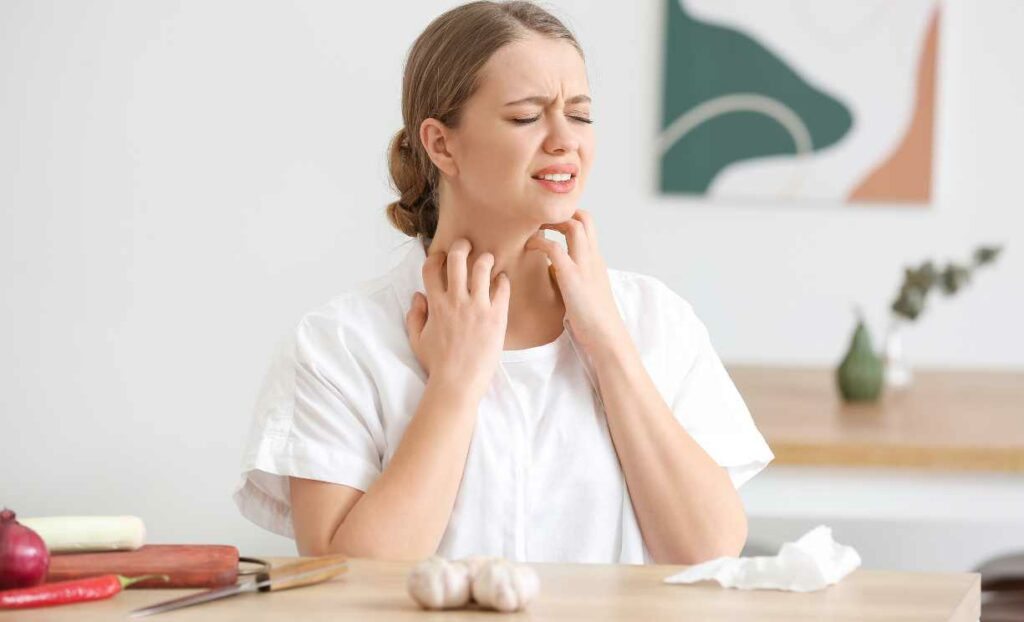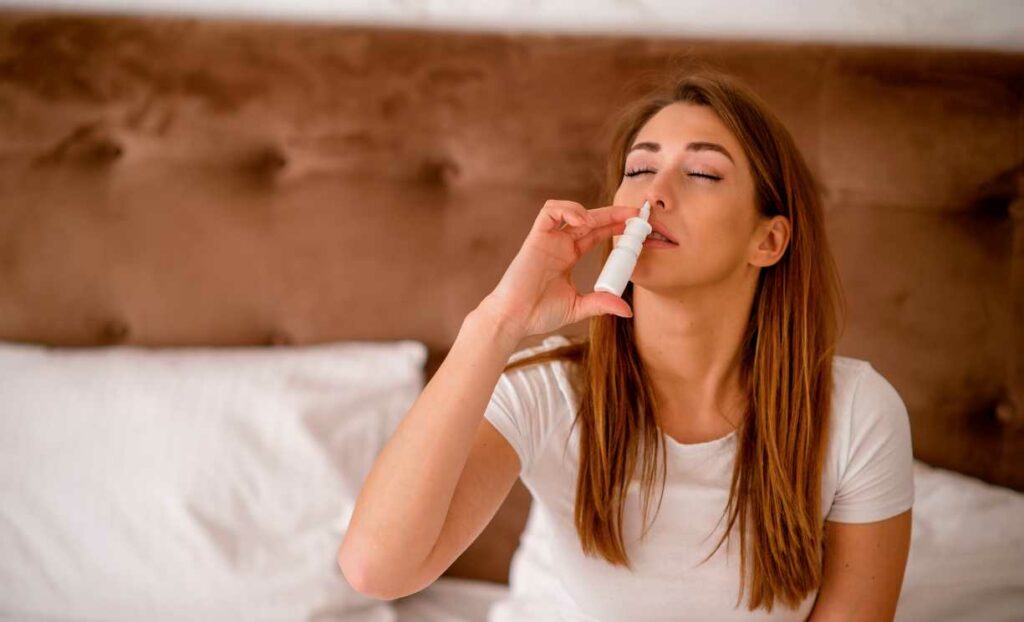Menopause, a transformative phase in a woman’s life, brings about a myriad of changes, including the potential emergence of new health challenges. Surprisingly, allergies may become more pronounced during this time, disrupting daily life for some women. In this blog, we will explore the connection between menopause and allergies and delve into effective treatment strategies to provide much-needed relief.
Contents
Can Menopause Cause Allergies?
Certainly! Menopause can sometimes trigger or exacerbate allergies in women. The hormonal changes that accompany menopause, particularly the decline in estrogen levels, can influence the immune system’s response. This hormonal shift may make women more sensitive to certain allergens, leading to the onset of new allergies or an increase in the severity of existing ones.
Common allergy symptoms like sneezing, itching, nasal congestion, or skin reactions may become more pronounced during menopause. While not all women experience this, for those who do, it’s essential to identify specific triggers and explore appropriate treatment options, which may include antihistamines, hormonal therapies, or lifestyle adjustments. Seeking guidance from a healthcare professional can help manage menopausal allergies effectively and improve overall well-being during this transitional phase.
What Allergies Are Linked To Menopause?
Menopause itself does not cause allergies, but the hormonal changes that occur during this phase can influence the immune system and exacerbate existing allergies or trigger new sensitivities in some women. Common allergies that may be affected by menopause-related hormonal fluctuations include:
- Environmental Allergies: Menopausal women may experience heightened sensitivity to environmental allergens, such as pollen, mold, dust mites, and pet dander. This increased sensitivity can lead to more pronounced allergic reactions, including sneezing, nasal congestion, and itchy or watery eyes.
- Food Allergies: Hormonal changes during menopause can impact the immune system’s response to certain foods. While menopause itself does not cause food allergies, some women may notice changes in their body’s reaction to specific allergenic foods, potentially leading to new sensitivities.
- Skin Allergies: Menopause-related hormonal fluctuations can affect the skin, making women more susceptible to skin allergies. This may manifest as itching, redness, or rashes in response to skincare products, fabrics, or environmental factors.
- Hormone-Related Allergies: Hormonal changes, particularly the decline in estrogen levels, can influence immune responses. Some women may experience changes in their body’s reaction to allergens due to hormonal fluctuations, impacting the severity of allergic symptoms.
- Respiratory Allergies: Women going through menopause may be more prone to respiratory allergies, such as allergic rhinitis or asthma. The hormonal changes can contribute to inflammation in the respiratory tract, potentially exacerbating allergy-related respiratory symptoms.
It’s essential to recognize that the relationship between menopause and allergies is complex and varies among individuals. Not all women will experience changes in allergic responses during menopause. If someone suspects that menopause is influencing their allergies or if they develop new sensitivities, consulting with a healthcare professional, such as an allergist or immunologist, is advisable.
Triggers For Allergies During Menopause
During menopause, hormonal changes can influence the immune system and potentially exacerbate or trigger allergies. Several factors may contribute to the onset or worsening of allergies during this phase:
- Hormonal Fluctuations: The decline in estrogen levels during menopause can impact the immune system’s response to allergens. Hormonal fluctuations may make women more sensitive to certain triggers, leading to increased allergic reactions.
- Changes in Immune Function: Hormones play a crucial role in regulating immune function. As hormonal levels shift during menopause, the immune system’s responsiveness can be altered. This may result in heightened sensitivity to environmental allergens.
- Respiratory Changes: Menopausal women may experience changes in the respiratory system, including increased susceptibility to respiratory allergens. This can contribute to the development or exacerbation of conditions such as allergic rhinitis or asthma.
- Skin Sensitivity: Hormonal fluctuations can impact skin health and make women more susceptible to skin allergies. Changes in skin sensitivity may lead to reactions to skincare products, fabrics, or environmental factors.
- Genetic Predisposition: Genetic factors can influence the likelihood of developing allergies. If there is a family history of allergies, women may be more predisposed to experiencing allergic reactions during menopause.
- Environmental Allergens: Menopausal women may become more sensitive to common environmental allergens such as pollen, mold, dust mites, and pet dander. Exposure to these allergens can trigger or worsen allergy symptoms.
- Stress: Menopausal symptoms, coupled with other life stressors, can contribute to heightened stress levels. Stress is known to impact the immune system and may exacerbate allergic responses.
- Dietary Changes: Changes in dietary habits during menopause can also play a role. Women may develop new sensitivities or experience allergic reactions to certain foods, additives, or preservatives.
Treatment Strategies For Allergies During Menopause
Treatment strategies for allergies during menopause aim to alleviate symptoms and improve overall well-being. Here are several approaches that can be considered:
- Identifying Allergens: Begin by identifying specific allergens that trigger symptoms. Consult with an allergist to undergo comprehensive testing, allowing for a clear understanding of environmental, food, or other potential triggers.
- Hormone Replacement Therapy (HRT): For women whose allergies are closely linked to hormonal changes during menopause, Hormone Replacement Therapy (HRT) may be considered. HRT aims to restore hormonal balance, potentially reducing allergy symptoms. However, the decision to pursue HRT should be made in consultation with a healthcare professional, weighing the benefits and potential risks.
- Antihistamines: Over-the-counter or prescription antihistamines can effectively manage allergy symptoms. These medications work by blocking the action of histamines, chemicals released during an allergic reaction, and can provide relief from sneezing, itching, and nasal congestion.
- Nasal Corticosteroids: Nasal corticosteroids, available in nasal spray form, can help reduce inflammation in the nasal passages. This can alleviate symptoms such as nasal congestion and sneezing.
- Immunotherapy: Allergy shots, a form of immunotherapy, may be recommended for individuals with persistent and severe allergies. This treatment involves gradually exposing the body to small amounts of allergens, helping build tolerance over time.
- Natural Remedies: Some individuals find relief from menopausal allergies through natural remedies. Saline nasal rinses, incorporating local honey into the diet, or exploring herbal supplements known for their anti-allergic properties are among the options. However, it’s crucial to consult with a healthcare provider before trying these remedies.
- Maintaining a Healthy Lifestyle: Adopting a healthy lifestyle can contribute to overall well-being and may indirectly help manage allergy symptoms. Regular exercise, a balanced diet, stress management techniques, and proper hydration all play a role in supporting the immune system.
Natural Ways To Manage Allergies During Menopause
Treatment for allergies during menopause involves adopting natural approaches that aim to alleviate symptoms and promote overall well-being. While individual responses may vary, here are some natural ways to manage allergies during menopause:
- Balanced Diet: Adopt a balanced and healthy diet rich in fruits, vegetables, whole grains, and lean proteins. These foods provide essential nutrients that support the immune system and overall health.
- Probiotics: Incorporate probiotic-rich foods like yogurt or consider taking probiotic supplements. Probiotics promote a healthy balance of gut bacteria, which plays a role in immune function.
- Local Honey: Some people find relief from seasonal allergies by consuming local honey. While scientific evidence is limited, the theory is that exposure to small amounts of local pollen in honey may help build tolerance.
- Quercetin-Rich Foods: Include foods high in quercetin, a natural antihistamine, in your diet. This includes apples, berries, onions, and leafy greens.
- Omega-3 Fatty Acids: Increase the intake of omega-3 fatty acids found in fish, flaxseeds, and walnuts. Omega-3s have anti-inflammatory properties that may help reduce allergic reactions.
- Herbal Teas: Drink herbal teas with anti-inflammatory properties, such as chamomile or peppermint. These teas may help soothe allergy symptoms.
- Steam Inhalation: Inhaling steam can help relieve nasal congestion and soothe irritated nasal passages. Add a few drops of essential oils like eucalyptus or peppermint for added benefits.
- Air Purifiers: Use air purifiers in your home to reduce indoor allergens like dust mites, pet dander, and mold.
- Allergy-Reducing Practices: Implement practices to reduce exposure to allergens, such as using allergen-proof pillowcases and mattress covers, washing bedding regularly in hot water, and keeping windows closed during peak pollen seasons.
- Acupuncture: Some individuals find relief from allergies through acupuncture, which is believed to balance the body’s energy and modulate immune responses.
Conclusion
In conclusion, the treatment of allergies during menopause requires a comprehensive and individualized approach to ensure effective relief and improved well-being. The interplay between hormonal changes and immune responses can manifest as exacerbated or new allergic reactions, making it essential to identify triggers and implement targeted treatment strategies. Whether through a balanced diet, natural remedies, or lifestyle modifications, women can take proactive steps to manage allergies during this transformative phase.





